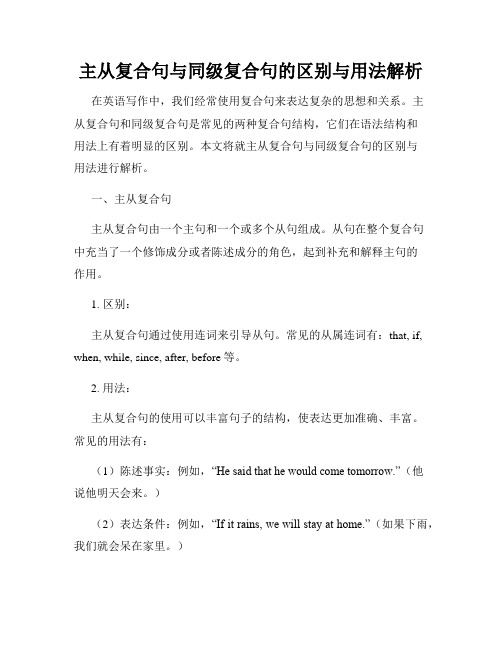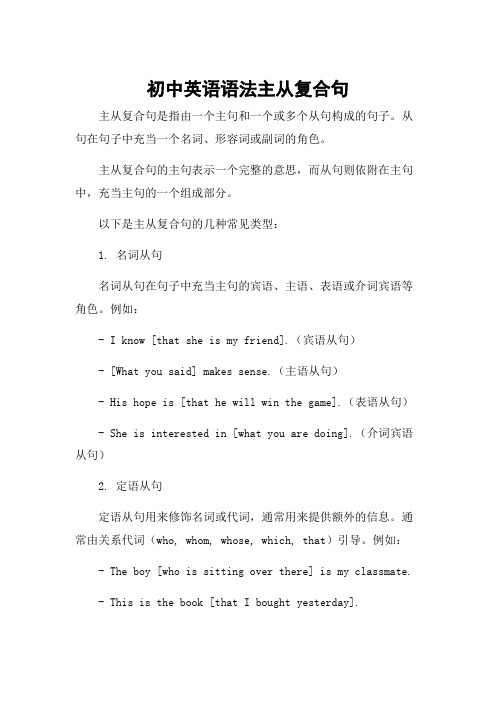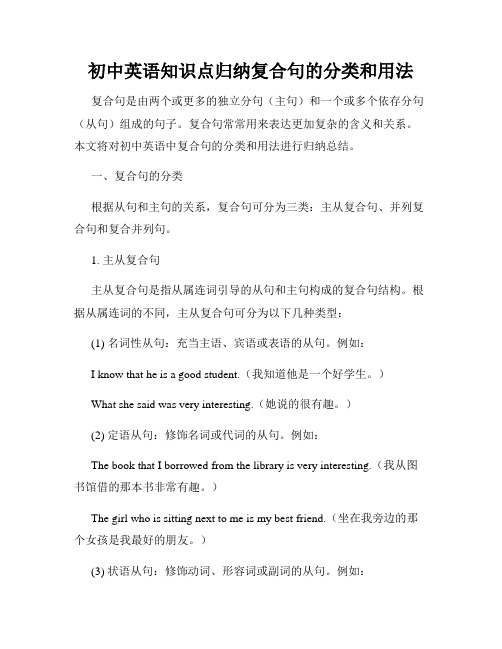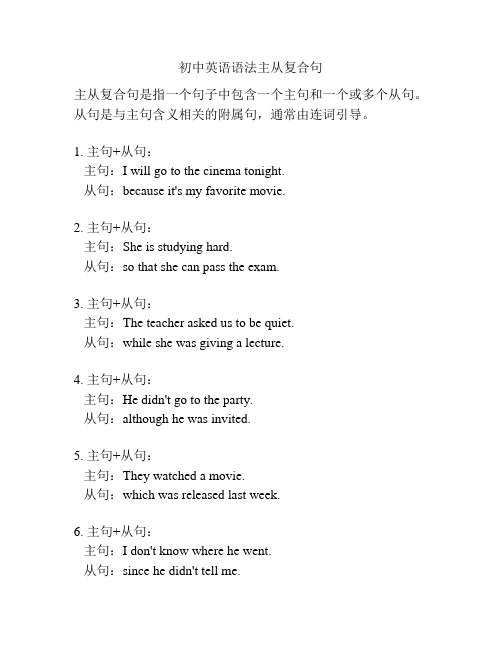英语学习(主从复合句)
主从复合句与同级复合句的区别与用法解析

主从复合句与同级复合句的区别与用法解析在英语写作中,我们经常使用复合句来表达复杂的思想和关系。
主从复合句和同级复合句是常见的两种复合句结构,它们在语法结构和用法上有着明显的区别。
本文将就主从复合句与同级复合句的区别与用法进行解析。
一、主从复合句主从复合句由一个主句和一个或多个从句组成。
从句在整个复合句中充当了一个修饰成分或者陈述成分的角色,起到补充和解释主句的作用。
1. 区别:主从复合句通过使用连词来引导从句。
常见的从属连词有:that, if, when, while, since, after, before等。
2. 用法:主从复合句的使用可以丰富句子的结构,使表达更加准确、丰富。
常见的用法有:(1)陈述事实:例如,“He said that he would come tomorrow.”(他说他明天会来。
)(2)表达条件:例如,“If it rains, we will stay at home.”(如果下雨,我们就会呆在家里。
)(3)表示原因:例如,“Since she is busy, she can't attend the meeting.”(因为她很忙,她不能参加会议。
)二、同级复合句同级复合句由两个或多个并列的子句组成,这些子句在逻辑上相互独立,但在句子结构上却具有相同的地位和作用。
1. 区别:同级复合句通过使用并列连词来连接两个或多个并列的子句。
常见的并列连词有:and, but, or, so, yet等。
2. 用法:同级复合句的使用可以将相同或相关的信息以均衡和平行的方式呈现,使句子更加丰满。
常见的用法有:(1)并列两个或多个同等重要的观点:例如,“She likes reading books and watching movies.”(她喜欢读书和看电影。
)(2)对比两个相反的观点:例如,“He is intelligent, but she is hardworking.”(他聪明,但她勤奋。
初中英语语法主从复合句

初中英语语法主从复合句主从复合句是指由一个主句和一个或多个从句构成的句子。
从句在句子中充当一个名词、形容词或副词的角色。
主从复合句的主句表示一个完整的意思,而从句则依附在主句中,充当主句的一个组成部分。
以下是主从复合句的几种常见类型:1. 名词从句名词从句在句子中充当主句的宾语、主语、表语或介词宾语等角色。
例如:- I know [that she is my friend].(宾语从句)- [What you said] makes sense.(主语从句)- His hope is [that he will win the game].(表语从句)- She is interested in [what you are doing].(介词宾语从句)2. 定语从句定语从句用来修饰名词或代词,通常用来提供额外的信息。
通常由关系代词(who, whom, whose, which, that)引导。
例如:- The boy [who is sitting over there] is my classmate.- This is the book [that I bought yesterday].- The woman [whose car was stolen] reported it to the police.3. 状语从句状语从句用来修饰主句中的动词,形容词或副词,提供额外的信息。
常见的状语从句有时间状语从句、原因状语从句、结果状语从句、条件状语从句和方式状语从句等。
例如:- She went to bed [after she finished her homework].(时间状语从句)- He failed the exam [because he didn't study].(原因状语从句)- They are so tired [that they can't walk anymore].(结果状语从句)- If it rains tomorrow, [we will stay at home].(条件状语从句)- He did it [in the way that she had instructed].(方式状语从句)以上是主从复合句的几种常见类型,。
英语复习课件:专题8主从复合句

The slave clause is a subordinate clause that contains additional information or details related to the master clause.
These clauses express a condition that must be met for the action in the main clause to occur. Example: "If you want to succeed, you must work hard."
These clauses provide the reason for the action in the main clause. Example: "Because he was late, he missed the bus."
The slave clause is introduced by a subordinating conjunction such as "because," "although," "when," etc.
Classification of master-slave compound sentences
English Review Courseware Topic 8
Principal Subo
目录
CONTENTS
• Introduction to master-slave compound sentences • nominal clause • Attributive clause • Adverbial clauses • Analysis of the Difficulties in the Subject
初中英语主从复合句 (名词性从句 +定语从句 +宾语从句 +状语从句 )

初中英语专题:主从复合句名词性从句 +定语从句 +宾语从句 +状语从句1.—Could you tell____?—You can take No. 16 bus.A.how can I get to the Olympic Park B.how I can get to the Olympic ParkC.how did I get to the Olympic Park D.how I got to the Olympic Park全面解析:结合题干及选项可知此空是宾语从句,语序要用陈述句语序,排除A与C;由You can take No. 16 bus.可知此空要用一般现在时,故答案为B。
2.If you _______ hard, you _______ behind.A.won't study; will fall B.don't study; fallC.won't study; fall D.don't study; will fall全面解析:if 引导的条件状语从句,谓语动词要用一般现在时,主句要用一般将来时,故答案为D。
3.Mary will go to Sanya if she _________a five-day trip.A.have B.had C.will have D.has全面解析:A项是一般现在时复数,B项是一般过去时,C项是将来时,D项是一般现在时单数。
if 表示如果的含义的时候,应用主将从现的原则,即主句中用将来时,从句中用一般现在时的形式。
缺空在if 从句中作谓语动词,应用一般现在时。
she是第三人称单数,谓语动词要用第三人称单数形式,故选D。
4.I didn't know .A.where does Tom buy the gift.B.where Tom bought the gift.C.where did Tom buy the gift.D.where Tom will buy the gift.全面解析:分析句子结构可知,填空处是宾语从句,宾语从句用陈述句语序,选项AC是疑问句语序,排除AC;根据I didn't know 可知,主句是一般过去时,宾语从句用适合的过去时态,选项D是一般将来时,再排除D。
英语主从复合句大全

主从复合句主句是主体,从句只是句子的一个成分,换言之,将句子(除谓语外)的各个成分扩展开来就成了从句。
关联词分五类:疑问代词:who(whom/whose),which, what,关系代词:who(whom/whose),which, that,疑问副词:when, where, why, how关系副词:when, where, why从属连词:that (无词义),whether, if, although, afterbecause, before, when, since,as soon as, as long as只有从属连词没有句子功用,即不担任句子成分。
从句分为五类:主语从句宾语从句表语从句前三项都是名词性从句,句中作用如同名词。
一般都不用逗号,所用关联词相同:1,连词that/whether/ifwhen /where /how /why(引导间接疑问句)一.主语从句subject clause,也可分为三种:that引导的主从/ 由连接代副词引导的主从/ what和whoever等引导的主从。
1由that引导的主从,用得最多。
(that 后面是主语)“That she became an artist may have been due to her father’s influence.”她成为画家可能是受其父亲的影响。
上面句子看着别扭陌生,换成it引导的句子就熟悉了,因为一般除强调外都后置而由it代替,有五种形式:(1)+ that 、、、It is(2)、、、It’(3)宾语) or adverbial(副词)) + that、、、’re right.It struck me that we ought to make a new plan. 我忽然想起我们应该制订一个新计划。
我从未想到或许她是在说谎(4)、、、It is said)that you was suffering from a stone in the kidney. 谣传说/据说你得了肾结石。
初中英语知识点归纳复合句的分类和用法

初中英语知识点归纳复合句的分类和用法复合句是由两个或更多的独立分句(主句)和一个或多个依存分句(从句)组成的句子。
复合句常常用来表达更加复杂的含义和关系。
本文将对初中英语中复合句的分类和用法进行归纳总结。
一、复合句的分类根据从句和主句的关系,复合句可分为三类:主从复合句、并列复合句和复合并列句。
1. 主从复合句主从复合句是指从属连词引导的从句和主句构成的复合句结构。
根据从属连词的不同,主从复合句可分为以下几种类型:(1) 名词性从句:充当主语、宾语或表语的从句。
例如:I know that he is a good student.(我知道他是一个好学生。
)What she said was very interesting.(她说的很有趣。
)(2) 定语从句:修饰名词或代词的从句。
例如:The book that I borrowed from the library is very interesting.(我从图书馆借的那本书非常有趣。
)The girl who is sitting next to me is my best friend.(坐在我旁边的那个女孩是我最好的朋友。
)(3) 状语从句:修饰动词、形容词或副词的从句。
例如:He will call me when he arrives.(他到达时会给我打电话。
)She is happy because she passed the exam.(她因为通过了考试而很开心。
)2. 并列复合句并列复合句是由两个或更多的并列分句构成的复合句结构,表示并列关系。
主要有以下几种形式:(1) 并列连词连接:用于连接并列分句的连词有and、or、but等。
例如:I like apples and she likes oranges.(我喜欢苹果,她喜欢橙子。
)You can go home or you can stay here.(你可以回家或者留在这里。
英语主从复合句精编资料

英语主从复合句初中英语语法之主从复合句(The complex sentences)主从复合句(初中掌握三类从句,即宾语从句、状语从句、定语从句)1. 宾语从句宾语从句在主从复合句中起宾语的作用,既可作谓语动词的宾语,也可作介词、非谓语动词(动词不定式、动名词、分词)的宾语。
1) 引导宾语从句的关联词的用法➢陈述意义的宾语从句,由从属连词that引导,that本身无义,在口语或非正式文体中常可省略。
➢ e.g. She said (that) she would come. (她说她将会来)➢➢一般疑问意义的宾语从句由从属连词whether或if引导,如果强调“究竟是…还是不…”,可在whether后加not ➢ e.g. Can you tell me if/whether you can come here tomorrow?➢(你能告诉我是否你能来这儿明天)➢➢特殊疑问意义的宾语从句,由连接代词who,whom,whose,what,which和连接副词when,where,why,how引导,宾语从句中的语序为陈述式语序。
➢ e.g. Please tell me when you were born.➢(请告诉我你什么时候出生)2) 学习宾语从句应该注意的几个问题➢当主句谓语动词是think、believe、imagine等时,后面的宾语从句➢要表示否定意义时,要通过主句的否定式来实现,即否定主句中的动词。
➢ e.g. 我认为他明天不会来。
➢(wrong)I think he will not come tomorrow.➢(right)I don’t think he will come tomorrow.➢(我想他将不会来)➢某些形容词后面也可有宾语从句,这些形容词有:sure(确信)、certain(无疑、肯定)、glad(高兴)、 pleased(乐意)、happy(幸福)、afraid(害怕)、surprised(惊奇)、satisfied(满足)等。
初中英语语法主从复合句

初中英语语法主从复合句主从复合句是指一个句子中包含一个主句和一个或多个从句。
从句是与主句含义相关的附属句,通常由连词引导。
1. 主句+从句:主句:I will go to the cinema tonight.从句:because it's my favorite movie.2. 主句+从句:主句:She is studying hard.从句:so that she can pass the exam.3. 主句+从句:主句:The teacher asked us to be quiet.从句:while she was giving a lecture.4. 主句+从句:主句:He didn't go to the party.从句:although he was invited.5. 主句+从句:主句:They watched a movie.从句:which was released last week.6. 主句+从句:主句:I don't know where he went.从句:since he didn't tell me.7. 主句+从句:主句:She wants to buy a new car.从句:because her old one broke down.在这些例子中,主从复合句的关系是主句是主要内容,而从句是对主句的补充、说明、原因或条件。
起到进一步解释主句的作用。
从句的引导词包括连词如because、so that、while、although,以及关系代词/副词如which、where、because等。
- 1、下载文档前请自行甄别文档内容的完整性,平台不提供额外的编辑、内容补充、找答案等附加服务。
- 2、"仅部分预览"的文档,不可在线预览部分如存在完整性等问题,可反馈申请退款(可完整预览的文档不适用该条件!)。
- 3、如文档侵犯您的权益,请联系客服反馈,我们会尽快为您处理(人工客服工作时间:9:00-18:30)。
高考英语语法讲解——主从复合句(附练习题)复合句由一个主句和一个或一个以上的从句构成的句子叫复合句。
在复合句中主句是全句的主体,从句是全句的一个成分,不能独立。
从句有:名词性从句(主语从句,表语从句,宾语从句和同位语从句)状语从句定语从句(详细请看以下内容)II.状语从句状语从句是每年高考必考的内容,在高考试题中加上其它从句的干扰,以及倒装句,强调句的介入,使得状语从句更为复杂。
1.时间状语从句由下列连词引导:when,while,as,before,after,once,till,until,since,as soon as,now that,hardly…when,scarcely…when,no sooner…than,有一些表示时间的副词(短语)或名词短语也可引导时间状语从句。
如:directly,instantly,immediately,by the time,the moment,the second,the minute,the instant,every time,each time,next time,the last time等重点内容如下:①when,while,as引导的时间状语从句▲as表示“当……的时候”,往往和when/ while通用,但它着重强调主句与从句的动作或事情同时或几乎同时发生。
She came up as I was cooking.(同时)The runners started as the gun went off.(几乎同时)▲when(at or during the time that )既可以表示在某一点的时候,又可表示在某一段时间内,主句与从句的动作或事情可以同时发生也可以先后发生。
It was raining when we arrived.(指时间点)When we were at school, we went to the library every day.(在一段时间内)When we arrived there,the film had already begun.(先后发生)▲while意思是“当……的时候”或“在某一段时间里”。
主句中的动作或事情在从句中的动作或事情的进展过程中发生,从句中的动词一般要用延续性动词。
在when表示a period of time时,两者可以互换。
Please don’t talk so loud while/when others are working.He fell asleep while/when reading.Strike while the iron is hot.(不可用as或when,这里的while意思是“趁……”)②before状语从句的重点句型▲……之后……才:It was a long time before I got to sleep .▲不多久……就:It wasn’t long before he told me about the affair.▲不等……就:Before I could get in a word, he had measured me.▲刚……就:He hardly entered the room before he heard the telephone ring.▲先……再:You can have a few days to think about it before you make your decision.③since 引导的从句用延续性动词的过去式(包括过去完成时),则从句的动作已经结束,从句意思是否定的。
如果从句的动词是延续性的用完成时态,从句意思是肯定的。
▲He has never been to see me since I was ill.我病愈后,他一直未来看我。
(不在生病了)▲He has never been to see me since I have been ill.我病了,他一直未来看我。
▲I haven’t heard from him since he lived here.自从他这里搬走,我就没有收到他的信。
(不住在这儿了)▲I know him very well since he has lived here near us.自他住在我们附近以来,我对他很了解。
▲It’s three years since I was in the army.我退伍已三年了。
(不在服役了)▲It’s three years since I have been in the army=It's three years since he joined the army.我入伍已三年了。
④如果与till与until从句使用的主句是肯定的,则主句中谓语要用延续性动词如果与其使用的主句是否肯定的,则主句中谓语要用短暂性动词。
另till从句不可以置于句首,只有until从句可以放在句首。
not until 放在句首时主句要倒装。
2.原因状语从句由下列连词引导:as(由于),because(因为), since(既然),now (that)(既然), considering that(顾及到), seeing that(由于)。
I do it because I like it.因为我喜欢我才干。
(because不能与 so 连用)He couldn’t have seen me, because I was not there.他不可能见过我,因为当时我不在那儿。
Seeing (that) quite a few people were absent, we decided to put the meeting off.由于好些人都没到会,我们决定延期开会Now that/Since you are all here, let’s try and reach a decision.既然大家都来了咱们就设法做一个决定吧As she was ill, she didn’t come to the party.由于病了,她没来参加晚会。
Considering that they are just beginners, they are doing quite a good job.考虑到他们才刚刚学做,他们干得算很不错的了。
重点内容如下:①because语气最强,用于回答why的提问,可与强调词only,just 以及否定词not 连用。
但不可以与so连用。
如You shouldn’t get angry just because some people speak ill of you.另外注意与not连用时否定的转移。
He didn’t do such a thing because he was afraid of his wife.他并不是因为怕他的妻子才做这样的事。
Cf:He didn’t do such a thing,because he was afraid of his wife.因为怕妻子,他没有做这样的事。
because引导的从句可以被强调:It was because she wanted to study abroad that she entered for TOEFL②as语气较弱,since语气也较弱,但比as正式一些,所说明的原因比较明显或是已知的事实,多用于口语中,所以不应该强调。
常置于句首。
As all the seats were full,he stood there.Since you are going,I’ll go,too.③for虽解释为“因为”但只是一个并列连词,它引导的是并列句,不是原因状语从句。
The day was short,for it was December.3.地点状语从句由下列连词引导:where,wherever,anywhere,everywhere。
Anywhere he went,he got warm welcome.The girl takes the doll with her everywhere she goes.Wuhan lies where the Yangtze and the Han River meet.武汉位于长江和汉水汇合处。
Where there is a will, there is a way.有志者,事竟成。
You’d better make a mark where you have any questions.哪儿有问题,你最好在哪儿做个记号。
(这里where引导的从句不是定语从句)4.结果状语从句由下列连词引导:that,so…that,so that(从句中不带情态动词),such…that,with the result that等。
注意以下几种结构:①so+adj/adv+that…②such(a/an+adj)+n+that…③so+adj+a/an+n+that=such a/an+adj+n+that…④so many/much/few/little(少)+n+that…注意以上结构与定语从句so/such…as的区别。
This is such an interesting/so interesting a film that/as everyone wants to see it/(it).He didn’t plan his time well so that/so he didn’t finish the work in time.他没把时间计划好,结果没按时完成这项工作。
We left in such a hurry that we forgot to lock the door.我们走得匆忙,把门都忘了锁了。
The village is so small that it cannot be shown in the map.这村子太小,所以这地图上没有。
Jenny is such a clever girl that all the teachers like her very much = Jenny is so clever a girl that all the teachers like her very muchJenny是如此聪明的女孩,以至老师们都非常喜欢她。
I have had so many falls that I am black and blue all over.我摔了许多跤,以至于浑身青一块紫一块He has so few friends that he often feels lonely.他朋友很少,所以经常感到孤独。
